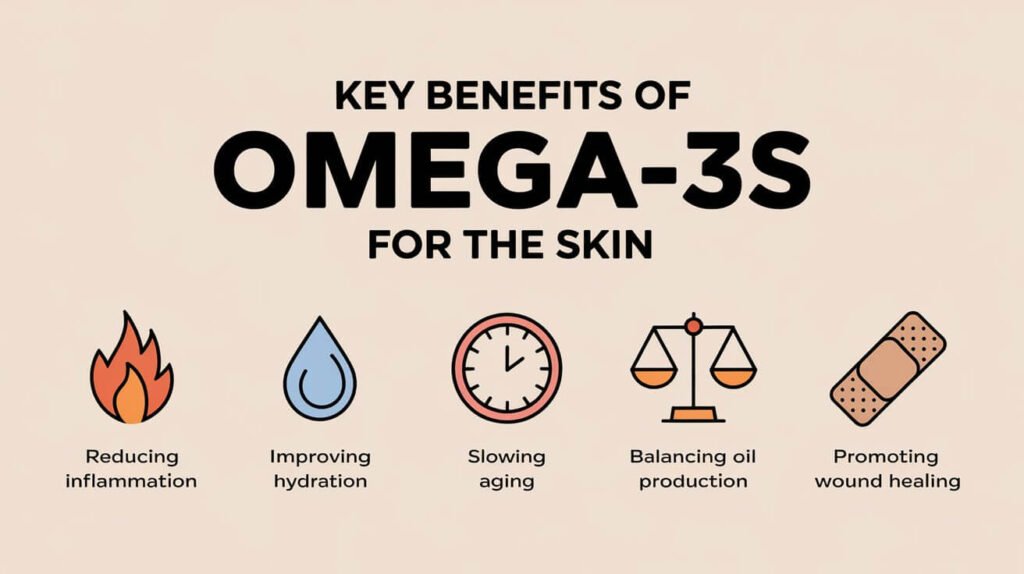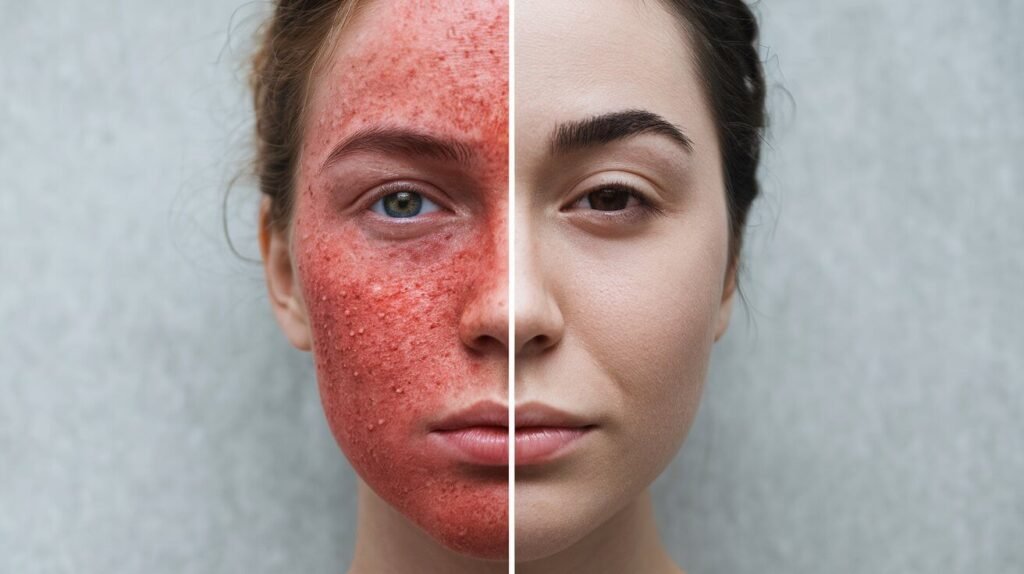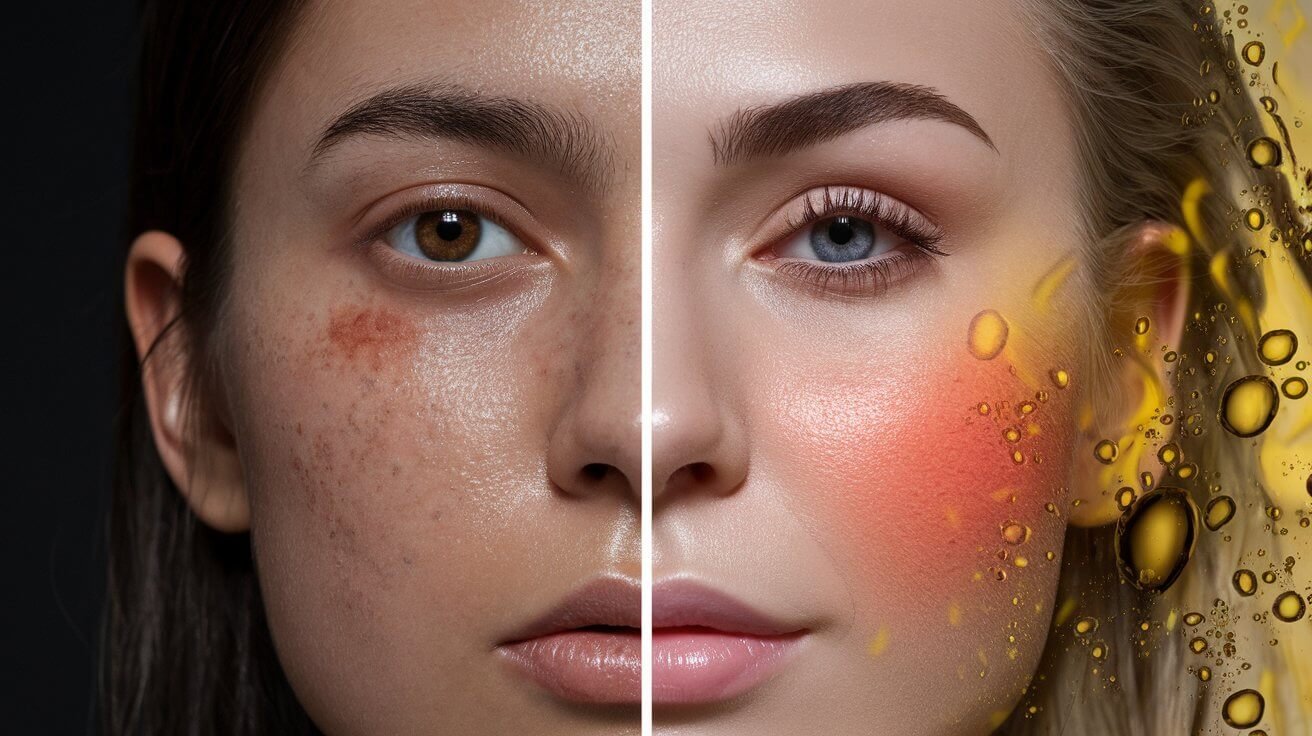Explore Healthy Living
Achieving healthy, glowing skin is a goal many people share, but what if part of the secret lies not in what you apply topically, but in what you consume? Omega-3 fatty acids, widely known for their heart health benefits, are also key players in maintaining vibrant and resilient skin. These essential fats provide a host of skin benefits, from reducing inflammation to combating aging. While creams and lotions can help, omega-3s offer a way to nurture your skin from the inside out.
What Are Omega-3 Fatty Acids?
Omega-3 fatty acids are a group of polyunsaturated fats that our bodies cannot produce on their own, meaning we must get them from food or supplements. The three primary types of omega-3s include:
- ALA (Alpha-linolenic acid): Found in plant-based foods like flaxseeds, chia seeds, and walnuts.
- EPA (Eicosapentaenoic acid): Sourced mainly from fatty fish and marine-based supplements.
- DHA (Docosahexaenoic acid): Also found in fish and marine algae.
All three forms of omega-3s are important for overall health, but when it comes to skin health, EPA and DHA are particularly effective. These fatty acids help support the structural integrity of skin cells, allowing them to function optimally, which leads to healthier, more radiant skin.

Omega-3s: A Natural Anti-Inflammatory for Skin
Inflammation is a leading cause of many skin conditions, from acne and eczema to psoriasis. Omega-3 fatty acids, especially EPA, are well known for their anti-inflammatory effects. They work by inhibiting the production of molecules that promote inflammation, such as cytokines and prostaglandins.
For those with eczema, a condition characterized by itchy, red, and inflamed skin, omega-3s can be particularly beneficial. Research published in the Journal of Investigative Dermatology indicates that people with eczema who supplemented with fish oil experienced reduced redness, itching, and scaling. Omega-3s work by strengthening the skin’s barrier, helping it retain moisture and protecting it from environmental irritants.
The anti-inflammatory benefits of omega-3s also extend to those with psoriasis, a skin condition that leads to the development of thick, scaly patches. A 2014 study in the Journal of the American Academy of Dermatology found that supplementing with EPA and DHA from fish oil improved skin texture and reduced the severity of psoriasis.
Omega-3s for Hydration: Moisturizing From Within
Ever wonder why your skin still feels dry even after slathering on a moisturizer? The issue might lie in what you’re not consuming rather than what you are applying. Omega-3 fatty acids are crucial for maintaining the skin’s lipid barrier, which is responsible for keeping moisture in and irritants out.
The skin’s lipid barrier is made up of fatty acids like omega-3s, which help prevent water loss through the outer layer of the skin. A strong lipid barrier is essential for maintaining hydrated, supple skin. Without sufficient omega-3s, this barrier weakens, resulting in dry, rough, and flaky skin. Including more omega-3-rich foods like fatty fish, flaxseeds, or walnuts in your diet, or opting for omega-3 supplements, can help improve your skin’s moisture retention.
Moreover, omega-3s help balance the skin’s oil production. They regulate sebum, the oily substance secreted by the skin to maintain moisture levels. By promoting balanced oil production, omega-3s help keep the skin hydrated without making it greasy or prone to breakouts.

Omega-3s: Slowing Down the Aging Process
While aging is inevitable, omega-3 fatty acids can help slow down some of its visible effects, particularly when it comes to skin aging. As we grow older, our skin loses elasticity, resulting in wrinkles, fine lines, and sagging. One of the main culprits is collagen breakdown, which weakens the skin’s structure.
EPA, in particular, helps prevent the release of enzymes that degrade collagen, the protein responsible for giving skin its firmness. By reducing collagen breakdown, omega-3s can help maintain skin elasticity and delay the formation of wrinkles. In addition, omega-3s improve blood circulation, ensuring that skin cells receive the nutrients and oxygen they need to stay healthy and radiant.
Another important aspect of omega-3s is their role in protecting the skin from sun damage. Excessive sun exposure is one of the primary causes of premature skin aging, leading to wrinkles, sunspots, and even skin cancer. Omega-3s help neutralize free radicals, unstable molecules that cause oxidative stress and damage skin cells. By combating oxidative stress, omega-3s can reduce the harmful effects of UV radiation and slow the visible signs of aging.
Omega-3s for Acne: A Natural Approach
Acne can be a stubborn condition, especially for adults who continue to struggle with breakouts. While acne is often linked to excess oil production, clogged pores, and bacteria, inflammation also plays a significant role. Omega-3 fatty acids can help address acne by reducing inflammation and regulating sebum production.
EPA has been found to reduce the amount of sebum produced by the skin. Sebum is the oily substance that, when overproduced, can clog pores and lead to acne breakouts. A study published in Lipids in Health and Disease found that individuals who took omega-3 supplements experienced fewer acne lesions and less severe breakouts, likely due to the reduction in inflammation and oil production.
For those struggling with chronic or cystic acne, increasing omega-3 intake through diet or supplements could provide a natural way to reduce flare-ups and support clearer skin.
Omega-3s Support Wound Healing
The process of wound healing is complex and requires the skin to regenerate cells and repair tissue. Omega-3 fatty acids play a vital role in this process, aiding in the formation of new blood vessels and reducing inflammation, which speeds up the healing of wounds.
Research in the British Journal of Nutrition highlights that omega-3 supplementation can enhance wound healing by promoting the formation of new tissues and reducing scarring. Omega-3s also help prevent excessive inflammation during the healing process, ensuring that the wound heals without unnecessary complications.
For individuals who experience frequent cuts, scrapes, or skin irritation, omega-3s can support faster recovery and healthier-looking skin after injury.
Omega-3s Improve Skin Conditions Like Psoriasis and Rosacea
For people suffering from chronic skin conditions like psoriasis and rosacea, omega-3s can offer relief. Both conditions are marked by inflammation, and omega-3s’ anti-inflammatory properties make them an effective natural treatment.
In psoriasis, the body’s immune system causes skin cells to grow too quickly, leading to scaly, red patches. Omega-3s help reduce the inflammatory response that triggers these flare-ups. In a study published in the British Journal of Dermatology, patients with psoriasis who took fish oil supplements saw significant improvements in their symptoms.
Rosacea, another inflammatory skin condition characterized by redness and visible blood vessels, can also benefit from omega-3 supplementation. By calming the skin and reducing redness, omega-3s help manage the visible symptoms of rosacea and improve skin resilience.
Omega-3s for Sensitive Skin
For those with sensitive skin, omega-3 fatty acids offer a soothing solution to irritation and redness. Sensitive skin is prone to reacting to environmental stressors, like pollution or harsh skincare products. Omega-3s strengthen the skin’s barrier, protecting it from these irritants and reducing the risk of flare-ups.

The anti-inflammatory properties of omega-3s help to calm sensitive skin, preventing redness and irritation. As part of a skincare routine, they work to strengthen the skin over time, making it less reactive to external stressors.
Nurturing Your Skin with Omega-3s
The road to healthy, radiant skin doesn’t begin and end with external skincare routines—it involves what you nourish your body with, too. Omega-3 fatty acids offer a range of benefits that go beyond moisturizing and anti-aging creams. From reducing inflammation and preventing acne to boosting hydration and promoting faster wound healing, omega-3s provide natural, long-term skin benefits.
Incorporating omega-3-rich foods like salmon, chia seeds, flaxseeds, and walnuts into your diet can significantly improve skin health. Alternatively, high-quality fish oil or plant-based omega-3 supplements can offer an easy way to ensure you’re getting enough of these essential fatty acids. Over time, you’ll likely notice improvements in your skin’s hydration, texture, and overall glow—showing that beauty truly does come from within.




